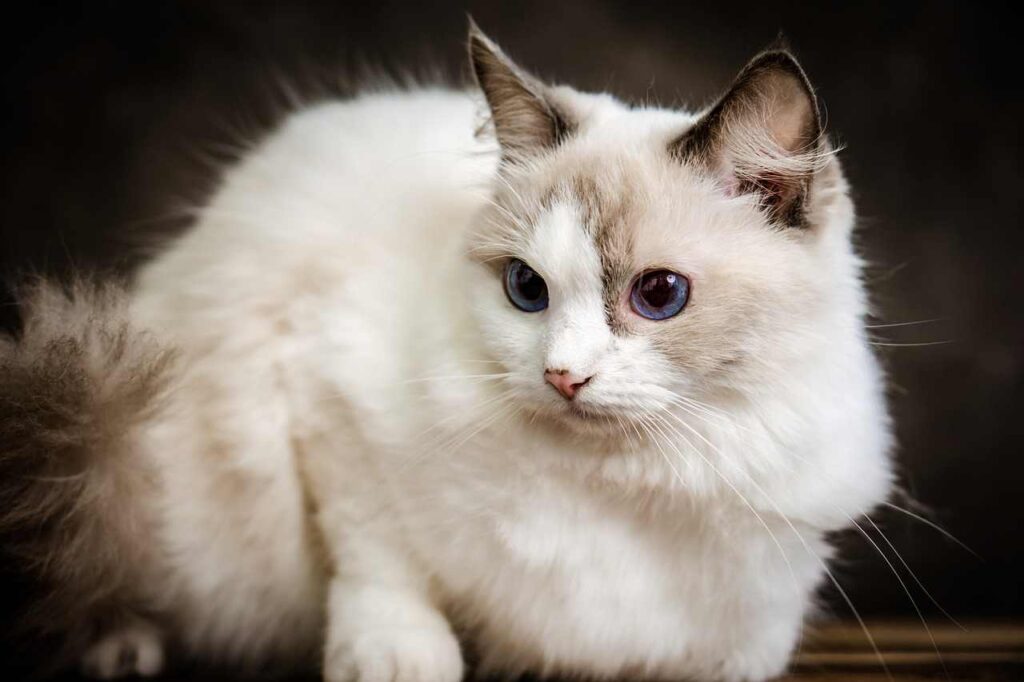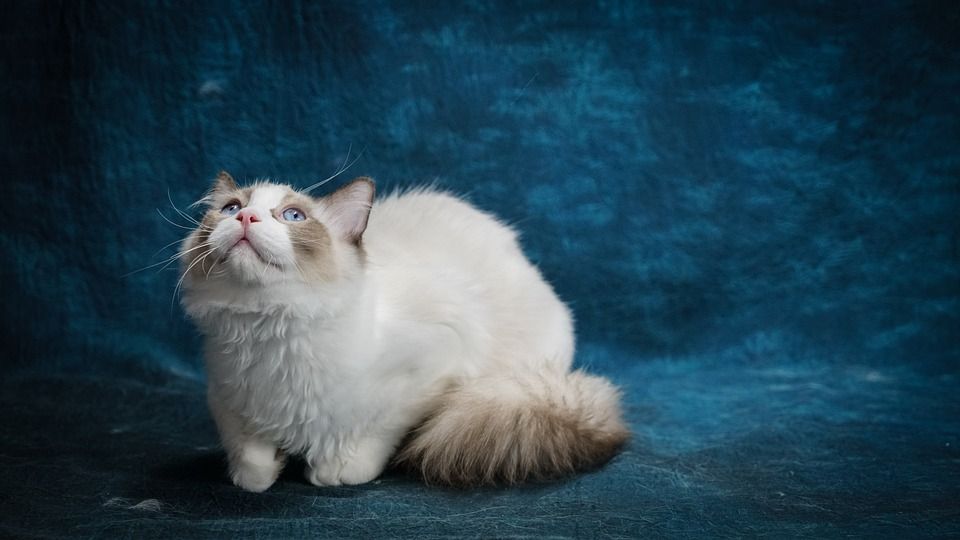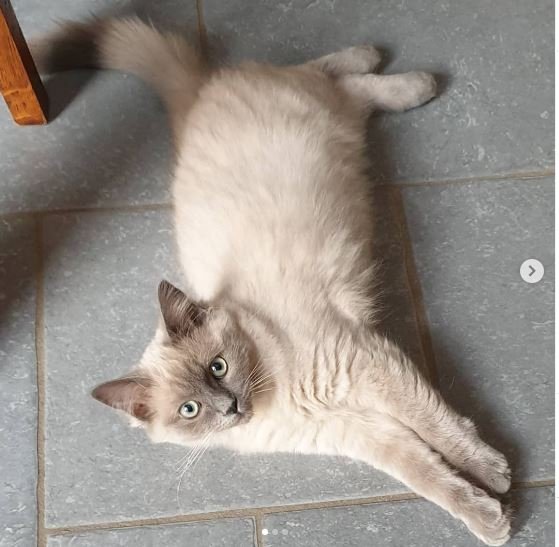Ragdoll cats are large in size. They treat them like friendly felines known for silky fur and go limp when picked up. They can weigh up to 20 pounds. They mature in four years. They come in different color patterns and have distinctive blue eyes. If you are worried about your Ragdoll’s weight, we recommend you consult a vet. Remember, a few factors could be at play, and it’s best to seek further guidance if needed.
Possible Reasons for Skinny Ragdolls
Various factors, including health issues and behavioural influences, should be considered when evaluating why Ragdolls may appear skinny.
For an indoor cat like a Ragdoll, the risk of weight loss due to stress or anxiety is higher than for outdoor cats. Changes in the household, new pets, or even rearranging furniture can trigger anxiety in sensitive Ragdolls, leading to decreased appetite and eventual weight loss.
Additionally, competition at the food bowl, common in multi-cat households, can result in a Ragdoll not getting enough food, causing them to appear skinny.
It’s important to create a calm and stress-free environment for your indoor Ragdoll to promote healthy weight and overall well-being.
Understanding Ragdoll Body Composition
When grasping Ragdoll’s body composition, we need to consider factors like weight loss and maintaining a healthy diet. Ragdolls’ long fur can make it tricky to gauge their weight visually, emphasizing the importance of hands-on assessments.
Feeling for ribs and recognizing Ragdolls’ naturally chunkier physique compared to other breeds is key to accurately evaluating their body condition.
Weight Loss Causes
To understand why a Ragdoll may appear skinny, it’s important to grasp the nuances of their body composition and potential weight loss causes. Ragdolls, like other cats, may experience weight loss due to factors such as inadequate nutrition. Dry food, a common dietary choice, may sometimes lack essential nutrients, leading to weight loss in Ragdolls.
Monitoring their food intake, ensuring they receive a balanced diet, and considering potential health issues are essential in addressing weight loss concerns. Additionally, understanding the impact of weight loss on a Ragdoll’s overall health and well-being is vital.
Healthy Ragdoll Diet
Understanding the body composition of Ragdolls is essential in ensuring a healthy diet for these cats. When it comes to their food intake, it’s important to provide a well-balanced diet that supports their growth and overall well-being. Here’s a simple guide to help you navigate your Ragdoll’s dietary needs:
| Food Group | Description | Importance |
|---|---|---|
| Protein | Essential for muscle | Critical for growth |
| Fats | Source of energy | Maintain healthy coat |
| Carbohydrates | Energy source | Regulate blood sugar |
| Vitamins | Support overall health | Enhance immune system |
| Minerals | Aid in bodily functions | Maintain strong bones |

Monitoring Ragdoll Weight Changes
We must pay attention to our Ragdoll’s weight changes for their overall health. Understanding the causes of weight loss, addressing health concerns promptly, and scheduling regular vet check-ups are vital steps.
These actions can help us guarantee our Ragdoll stays healthy and happy.
Weight Loss Causes
Monitoring Ragdoll weight changes is essential to detect potential health issues early on. Ragdolls may appear skinny due to underlying health problems like gastrointestinal issues, diabetes, hyperthyroidism, or organ failure. It’s vital to observe any rapid weight loss or changes in appearance in Ragdoll cats, as these could indicate serious health concerns.
Gradually changing to a new diet and opting for high-quality, grain-free options may assist in addressing weight issues in Ragdolls. Additionally, behavioral factors such as stress or anxiety from past experiences can contribute to weight loss in Ragdoll cats.
Health Concerns Addressed
Regularly evaluating your Ragdoll cat’s weight through hands-on examination is essential for early detection of potential health concerns.
You can determine if your cat is underweight by palpating its ribs and appraising its body characteristics. Ragdolls’ long fur can make visually evaluating weight challenging; hence, relying on hands-on evaluation is pivotal.
Understanding breed characteristics, such as a fat pad on the tummy, can help evaluate weight accurately.
Tracking your Ragdoll’s growth trajectory until around 3 years old can provide insights into their weight management.
If you notice any significant weight changes, it is advisable to seek a second opinion from a veterinarian to address any potential health issues promptly.
Ragdoll Diet and Feeding Guidelines
Establishing a balanced diet and adhering to proper feeding guidelines are essential to guaranteeing the best health and well-being for your Ragdoll cat. Incorporating wet food into your Ragdoll’s diet can provide essential moisture and nutrients.
Splitting their meals into multiple daily feedings can help regulate their food intake and monitor their eating habits effectively. This approach also helps prevent overeating and promotes a healthy weight.
Additionally, offering a mix of wet and dry food can offer dietary variety and cater to specific preferences or dietary needs your Ragdoll may have. Remember, a well-rounded diet, a suitable feeding schedule, and proper portion control are key to keeping your Ragdoll healthy and at an ideal weight.

Exercise and Activity Levels in Ragdolls
Ragdolls require regular exercise and engaging activities to maintain a healthy weight and overall well-being. To guarantee your Ragdoll stays active and healthy, consider the following:
- Interactive Toys:
Providing toys that encourage movement and play can help keep your Ragdoll physically active.
- Climbing Structures:
Ragdolls love to climb, so having cat trees or shelves where they can climb and explore can promote exercise.
- Engaging Play Sessions:
Spending quality time playing with your Ragdoll and using toys like feather wands or laser pointers can help them burn off excess energy and calories.
Seeking Veterinary Advice for Skinny Ragdolls
When addressing concerns about a skinny Ragdoll, consulting a veterinarian is essential to identify potential health issues and determine the appropriate course of action. Vets play an important role in diagnosing and treating underlying conditions that may be causing your Ragdoll to appear skinny. They can offer valuable veterinary advice on tailored diets, feeding schedules, and weight monitoring strategies to help your cat reach a healthy weight.
Regular check-ups and consultations with a vet are key in addressing weight concerns and ensuring the overall well-being of your skinny Ragdoll. Below is a table summarizing the importance of seeking veterinary advice for skinny Ragdolls:
| Importance of Veterinary Advice for Skinny Ragdolls |
|---|
| Identifying underlying health issues |
| Tailoring diets and feeding schedules |
| Monitoring weight changes |
| Ensuring overall well-being of the Ragdoll |

Frequently Asked Questions
How to Tell if a Ragdoll Is Too Skinny?
To determine if a Ragdoll is too skinny, assess their body condition for easily palpable ribs and a slight waistline, and look for signs like prominent spine or hip bones. Consult a vet for weight management guidance.
How Can I Fatten Up My Ragdoll Cat?
To help our Ragdoll gain weight, we’ll focus on boosting meals with nutrient-rich foods, controlling treat portions, and keeping up with fun playtime. Our fluffy friend deserves a healthy, happy belly!
Why Is My Cat So Skinny Even Though She Eats?
We noticed weight loss in our Ragdoll despite eating. Various health issues, like gastrointestinal problems or hyperthyroidism, could be the cause. Regular checkups, monitoring food intake, and seeking veterinary advice are essential for a tailored treatment plan.
Why Is My Ragdoll Cat Losing Weight?
Weight loss in Ragdoll cats can be concerning. Regular vet visits, monitoring food intake, and considering dietary changes are essential steps. By addressing potential health issues and habits, we can help our Ragdoll thrive.
Conclusion
A skinny Ragdoll cat is a concern, but with the right approach, you can identify and address the issue effectively. Whether it’s a simple dietary adjustment or medical intervention, your furry friend depends on you to provide the care they need.
By understanding your Ragdoll’s unique needs and monitoring their health, you can ensure they live a happy, healthy, and well-nourished life. If you’re ever in doubt, always consult with your veterinarian—they’re your best resource for keeping your cat in top shape.

Hey guys, My name is Simon Smith. I’m from Canada and live near Victoria
I live with my sweet family and have 20+ Ragdolls of different types. I love them as my children. My profession is as a hotel manager.
I love to keep Ragdolls and grow their breeder case. I have 7 years of experience.
I’m an expert in cat care. So, I’m here to provide you with new information about my cats daily. This is my blog website, so I request that you kindly visit our site daily.
If you’re a Ragdolls lover and you have any questions or confusion about cats, text me on the Contact Us page or Gmail.
Thank u
